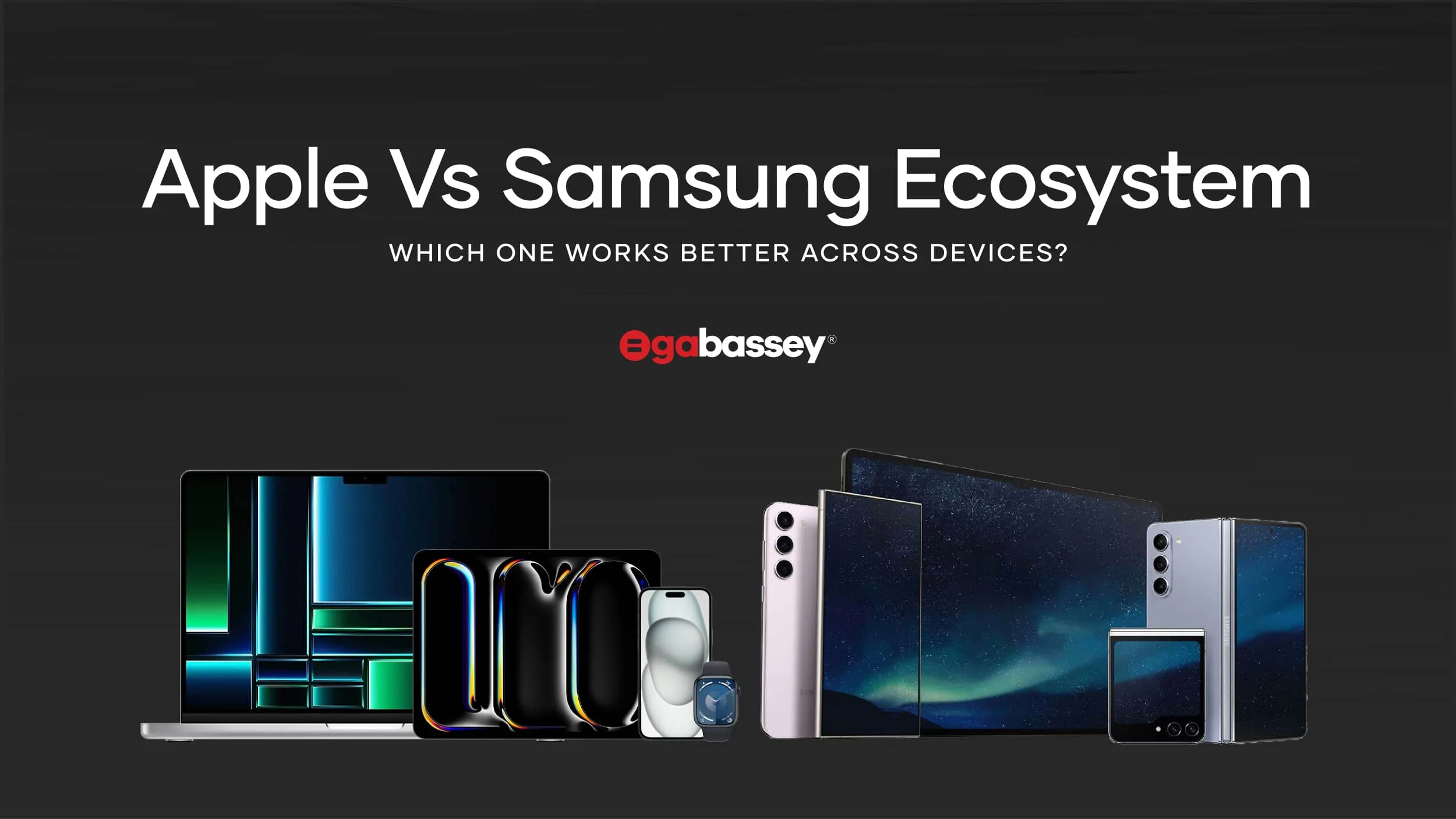Apple vs Samsung? Nah! We all know the smartphone war is old news. But in 2025, the real battle isn’t just about which phone takes the best selfie, it’s about the ecosystem.
Because let’s face it: it’s not just your phone anymore. It’s your laptop, earbuds, tablet, smartwatch, TV, even your fridge. The question now is:
Which tech giant makes your devices play nicest together Apple or Samsung?
Both ecosystems promise seamless sync, smart features, and a “once you’re in, you’ll never leave” kind of experience… Even more profound when you remember that Apple users typically say, “Once you go Mac, you can’t go back”. Let’s break it down.
Apple Ecosystem: The Cult of Convenience
Apple’s magic sauce isn’t just the sleek hardware; it’s how everything talks to everything else.
- AirDrop? Instant file sharing from iPhone to MacBook or iPad in two taps.
- Handoff? Start writing an email on your iPhone, finish it on your Mac.
- Universal Clipboard? Copy on one device, paste on another…like witchcraft.
- FaceTime and iMessage? Available across iPhone, iPad, and Mac so you can keep up the gossip while switching screens.
But the real cheat code? Continuity. You can answer calls on your Mac, use your iPhone camera as a webcam, or unlock your Mac with your Apple Watch.
And because Apple builds the hardware and software for every device, everything just… works. Smoothly. Quietly. Like an expensive butler who never complains.
Best for: People who hate fiddling with tech. If you’re deep in the Apple Garden, you’ll rarely feel the need to leave.
Samsung Ecosystem: Surprisingly Slick, With a Twist and with Windows in mind
Samsung’s not sitting quietly. Over the past few years, they’ve levelled up their ecosystem game big time, especially if you’re using Galaxy phones, tablets, and laptops together.
Here’s what it offers:
- Quick Share: Samsung’s answer to AirDrop, works across Galaxy devices and even with Windows.
- Samsung Flow: Sync your phone and PC, unlock your laptop with your phone, share files, and mirror your screen.
- Second Screen: Turn your Galaxy Tab into an extra display for your Galaxy Book.
- Call & Text Continuity: Use your tablet or laptop to handle calls and messages from your phone.
- SmartThings: Control your smart home setup, track your Galaxy devices, and even ping your lost phone from your Samsung TV.
Where Samsung really shines is variety. It has TVs, fridges, earbuds, smartwatches, and even air conditioners that are all smart and connected. And most of these work with Android and Windows too—giving you flexibility Apple just doesn’t.
Best for: Tech tinkerers, Android loyalists, and people who want more choice in hardware.
Apple vs Samsung Ecosystem: Feature Face-off
| Feature | Apple | Samsung |
| File sharing | AirDrop (Instant, reliable) | Quick Share (Good, cross-platform) |
| Device sync | Seamless (macOS, iOS, iPadOS) | Good (Android + Windows) |
| App continuity | Excellent (Safari, Notes, Mail, etc.) | Decent (Samsung apps, DeX, Flow) |
| Hardware variety | Limited (Only Apple gear) | Massive (Phones, TVs, tablets, appliances) |
| Smart home | HomeKit (Secure but limited) | SmartThings (Versatile, works with more brands) |
| Learning curve | Beginner-friendly | Slightly more setup needed |
| Cross-platform support | Nope (walled garden) | Yes (plays well with others) |
So, Which Ecosystem Actually Works Better?
It depends on who you are and how you use tech.
Pick Apple if:
- You already use an iPhone or Mac.
- You want everything to just work with no configuration.
- You value privacy, simplicity, and long-term support.
- You’re not planning to switch away from Apple anytime soon.
Pick Samsung if:
- You want flexibility between Android and Windows.
- You like having multiple options for tablets, TVs, smartwatches, etc.
- You’re willing to dig into the settings to customize things your way.
- You want a smart home that connects beyond just Apple-approved gadgets.
Final Verdict: Closed vs Open
- Apple is the perfect walled garden—beautiful, efficient, but you play by their rules.
- Samsung is more like a smart jungle—wild, full of options, and open to different platforms.
If you’re a creative pro, student, or business user who just wants things to work, Apple has the edge.
If you’re a tech lover, smart home nerd, or someone who hates being locked into one brand, Samsung’s ecosystem will give you room to play.




